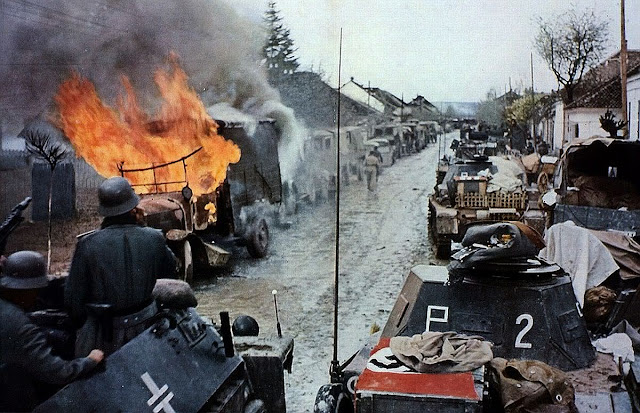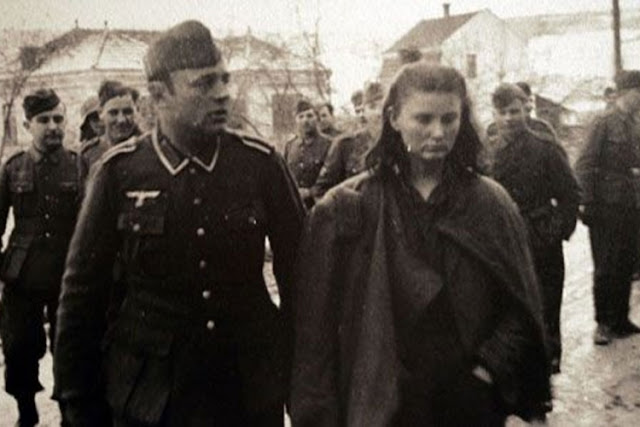Interesting Facts and figures about the Balkans in 1941 Part I
6 - 11 January. - Greek-Italian war - Greek army mounted a successful counter-offensive in southern Albania, front stabilizer by April.
January 20. - Bulgarian Cabinet votes for signing the Tripartite Pact.
January 22. - Colonel William Joseph Donovan, Roosevelt's special envoy, arrived in Belgrade (Balkan trip to visit Greece, Turkey, and Bulgaria).
January 29. - Died gene. Ioannis Metaxas, Greece's Prime Minister.
January 29. to February 17. - The Battle of Trebesin: Greeks succeed to take mountain peaks, at the cost of great sacrifices.
February 4. - The Hungarian Parliament ratified the agreement of Accession to the Tripartite Pact and the treaty of eternal friendship with Yugoslavia.
February 8. - Germany and Bulgaria signed a military pact.
February 14. - Hitler and Ribbentrop talk with Cvetkovic and Cincar- Markovic in the Berghof, the same day Roosevelt message to the Yugoslav government: since Lend-lease will help the peoples who may be victims of aggression.
February 17. - Bulgarian-Turkish signed a declaration of non-aggression.
February 22. - Roosevelt message to Prince Paul - the world is watching with sympathy to the countries which resist to aggressive forces.
February 25. - Operation abstention: British commandos tried to occupy the island of Kastellorizo in the far east of the Dodecanese in the Aegean Sea.
February 27. - In Budapest exchanged ratification Yugoslav-Hungarian agreement on eternal friendship.
March 1st. - Bulgaria joins the Tripartite Pact, the German Army the next day enters its territory.
March 4. - A secret meeting between Prince Paul and Hitler at the Berghof - the pressure for joining the to the Tripartite Pact.
March 5. - Great Britain breaks off diplomatic relations with Bulgaria; these days begins Operation Lustre, landing British and Commonwealth troops in Greece.
March 6 - The Crown Council of Yugoslavia decided to join to the Tripartite Pact, under conditions which Hitler dictated (Confirmed 20. 3.).
9 - 16. March. - Italian spring offensive against the Greeks in Albania - failure.
18. March. - Roosevelt sent a message to Belgrade: a country which surrender will have less favorably than those who are at least briefly be resisted.
18. March. - Former Prime Minister Milan Stojadinovic exiled to Greece, where the British took to Mauritius.
19th March. - Hitler's ultimatum to Prince Paul join to the Tripartite Pact in five days or following the invasion.
20. March. - After the Crown Council confirmed the decision to join to the Tripartite Pact, the three ministers resigned.
 |
| Ante Pavelić and Benito Mussolini in 1941 when Italy recognized Croatia as a sovereign state |
March 23. - Gen. Dusan Simovic warned Prince Paul that the Air Force could rebel if he signed a pact with the Axis; Churchill Prime Minister Cvetkovic: war will only be delayed but not avoided (in joining the Tripartite).
March 25. - Yugoslavia in Vienna joins to the Tripartite Pact, for what it promises: the preservation of integrity, without passage and transport of axial forces, will not be requested military assistance from Yugoslavia (more favorable than for other members of the Tripartite Pact) + secretly promised Thessaloniki after the war.
March 27 - A military coup the previous night, a large demonstration against Yugoslavia joining the Tripartite Pact in most parts of Yugoslavia. Peter II of Yugoslavia was proclaimed adult, General Dusan Simovic new prime minister
March 27. - Hitler's Directive 25: attacking Yugoslavia. Yugoslavia should be a smash, counting on the help of disaffected Croatians and the majority of its neighbors; Operation Barbarossa is postponed for four weeks.
 |
| Prince Paul with Adolf Hitler |
28. March. - Meeting of Benito Mussolini and Ante Pavelic in Rome.
28. March. - King Peter II took the oath.
29. March. - Josip Broz Tito, Secretary General of the Communist Party of Yugoslavia, arrived by plane from Zagreb to Belgrade.
 |
| The demonstrations in Belgrade on March 27, 1941 |
30. March. - The Yugoslav government issued a directive on "general activation" (secret mobilization); German High Command issued a directive regarding attacks on Yugoslavia ("Undertaking 25") and Greece ("Marita").
March 31 - The meeting of the "great work" of deputies HSS and representative government in Zagreb, Berlin sent a "Memorandum of Five", which claims that Yugoslavia no longer exists and asking for help and recognition of "free Croatian state". Ribbentrop's telegram to Macek - discourage him from cooperating with the Belgrade government.







Comments
Post a Comment